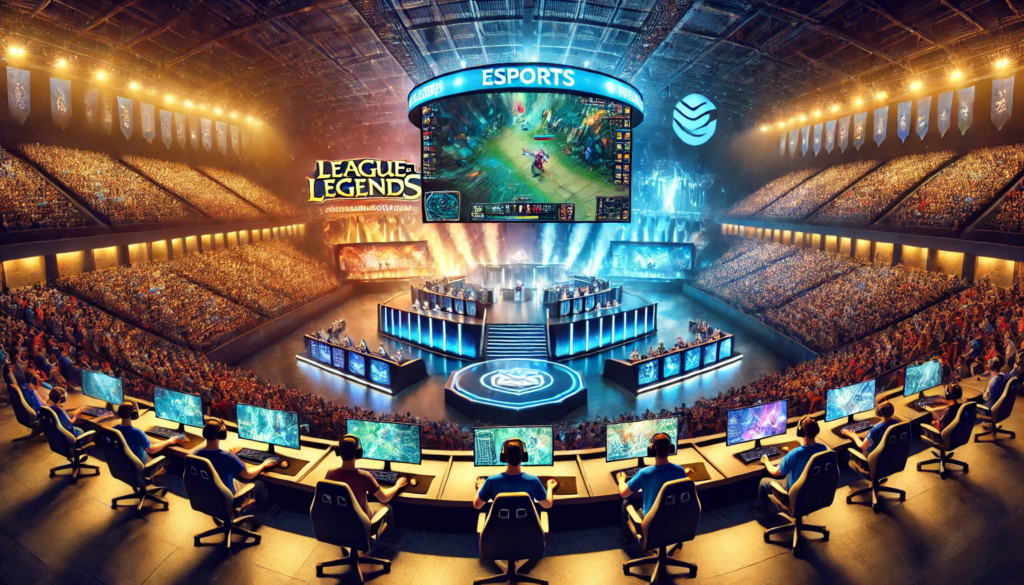
Esports, once considered a niche pastime for video game enthusiasts, has erupted into a billion-dollar industry that rivals traditional sports in popularity and influence. What began as informal gatherings of gamers has transformed into a global phenomenon with professional tournaments, massive sponsorships, and legions of fans around the world. Esports is no longer just “competitive gaming” it’s a mainstream cultural force that is reshaping how we view entertainment. So, how did esports rise to prominence, and where is it headed next?
The Esports Phenomenon: Competitive Gaming Redefined
At its core, esports involves organized, competitive gaming where individuals or teams face off in popular video games, often for massive cash prizes. Games like League of Legends, Dota 2, Fortnite, Counter-Strike: Global Offensive, and Overwatch have become household names, drawing millions of viewers to watch live on platforms like Twitch and YouTube, as well as in packed arenas.
Just like traditional athletes, esports competitors undergo intense training regimens, practicing for hours a day to hone their skills. These players, some of whom have achieved celebrity status, compete professionally for teams backed by major sponsors, including tech giants and consumer brands. The rise of esports has created a new class of digital athletes, and their growing fanbases are transforming gaming into a legitimate sporting event.
Esports by the Numbers: A Meteoric Rise
The growth of esports has been nothing short of meteoric. What started as small-scale tournaments has ballooned into an industry that generated over $1 billion in 2023, and that figure is only expected to grow. Major events, such as The International for Dota 2 and the League of Legends World Championship, attract millions of viewers worldwide and boast prize pools in the tens of millions of dollars.
Esports is not just an online phenomenon. Some of the largest competitions are held in massive stadiums and arenas, offering a live experience comparable to major sporting events. For example, the 2021 League of Legends World Championship finals in Reykjavík, Iceland, drew millions of online viewers, demonstrating the global appeal and excitement surrounding these events.
Corporate giants like Coca-Cola, Intel, and Samsung have jumped on board, sponsoring teams and tournaments alike, recognizing esports as a prime opportunity for brand exposure. Even traditional sports organizations and media companies are investing in esports, further validating its place in the entertainment hierarchy.
Shaping the Gaming Industry: The Esports Effect
The success of esports is not just benefiting gamers it’s having a profound impact on the broader gaming industry. Game developers are now designing titles with competitive gaming in mind, ensuring balance and depth that appeal to both casual players and professional athletes. Esports has become a driving force in the development of multiplayer games, and studios are investing heavily in creating titles that can thrive in the competitive gaming scene.
Additionally, the demand for high-performance gaming equipment has skyrocketed. The growth of esports has spurred innovations in gaming hardware, from precision-focused mice and keyboards to ultra-responsive gaming headsets and cutting-edge gaming PCs. As competitive gaming continues to push players to their limits, the demand for top-tier technology has never been higher.
Streaming Platforms: The Lifeblood of Esports
Streaming platforms have been pivotal in esports’ rise, providing a global stage for live competitions and fostering a vibrant community of fans and players. Twitch, YouTube Gaming, and Facebook Gaming have transformed esports into a spectator sport, where millions of viewers can watch their favorite teams battle it out in real time, engage with fellow fans, and even interact with the players themselves through live chat.
Twitch, in particular, has been instrumental in creating an immersive viewing experience for esports. Its real-time streaming capabilities, combined with interactive features, have turned esports into a social phenomenon where fans feel more connected than ever. Popular streamers and pro players can build massive followings, blurring the lines between gaming and entertainment.
An Industry Poised for Expansion
As esports continues its upward trajectory, its future looks incredibly bright. Audience sizes are growing year after year, and esports is expanding into new regions across the globe. While Asia, North America, and Europe currently dominate the scene, emerging markets in Latin America, the Middle East, and Africa are showing increased interest, offering untapped opportunities for growth and investment.
The push to include esports in traditional sporting events is also gaining momentum. Esports made its debut as a demonstration event in the 2018 Asian Games, and discussions are ongoing about its potential inclusion in future Olympic Games. Should esports find a place in the Olympics, it would represent a monumental step toward its full recognition as a legitimate sport.
Moreover, the educational sector is beginning to embrace esports. Universities around the world are offering scholarships for esports athletes, and some institutions are even developing programs focused on game design, digital media, and esports management, further cementing their role in the cultural landscape.
Esports A Cultural Powerhouse Here to Stay
Esports has evolved from a grassroots movement into a global powerhouse, influencing not only the gaming industry but the world of entertainment at large. With its thrilling competitions, massive prize pools, and passionate fanbase, esports is no longer a niche interest it’s a central part of how we experience digital entertainment today.
As technology continues to evolve and the esports ecosystem grows, the industry’s future is limitless. Whether you’re a dedicated gamer, a casual fan, or simply an observer of the changing entertainment landscape, one thing is clear: esports is here to stay, and it’s shaping the future of how we play, compete, and engage with the games we love.
by focusing on the evolution of esports, its growing influence, and the promising future of the industry. The language is more dynamic, engaging readers by highlighting esports’ global impact and cultural relevance.


